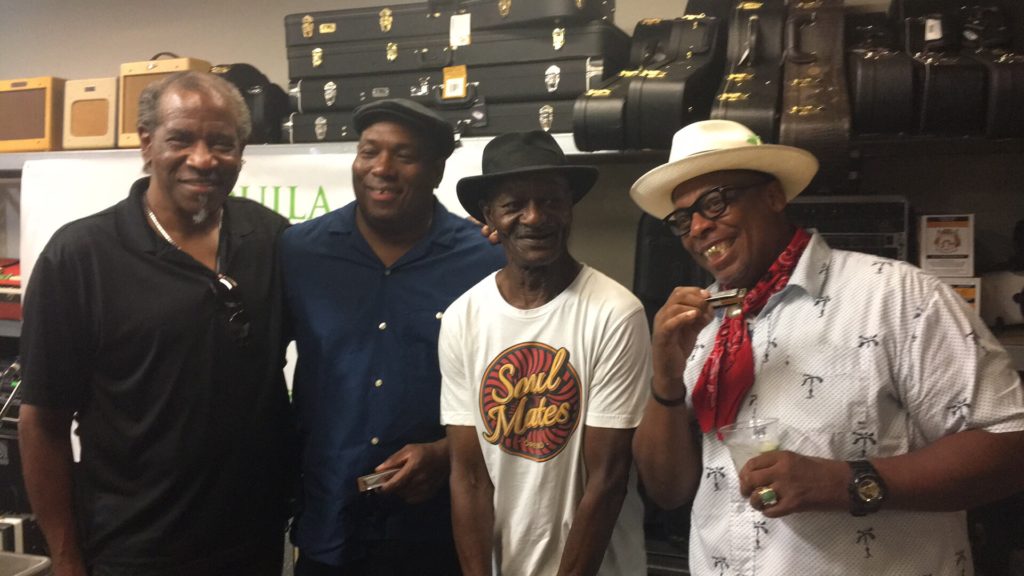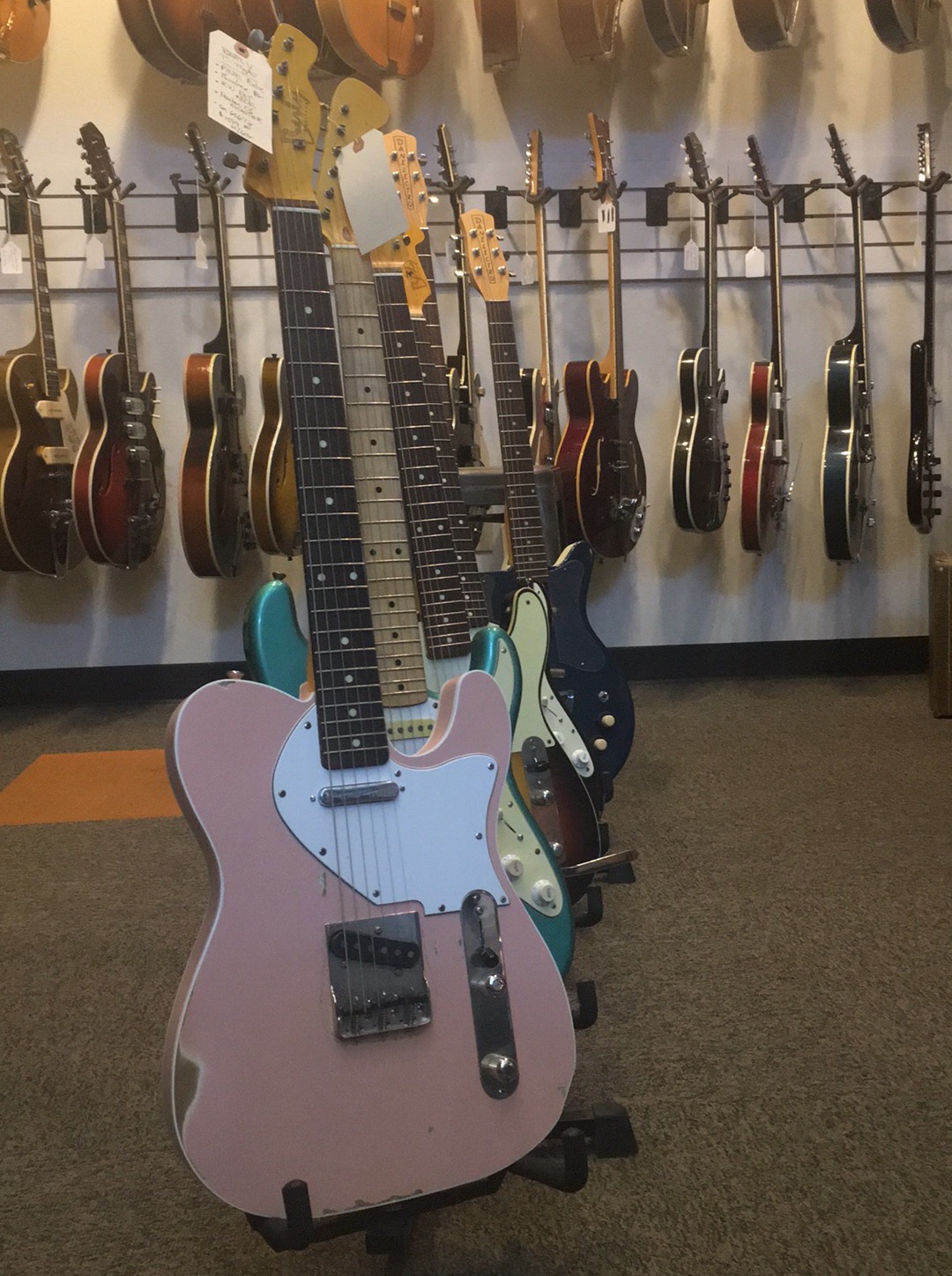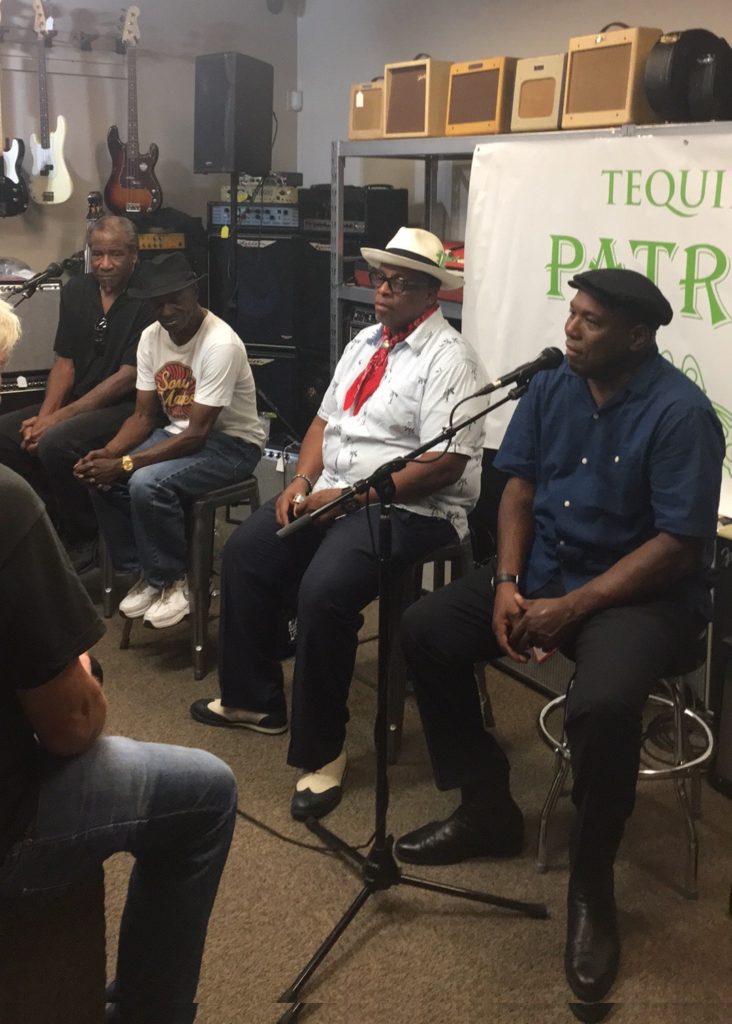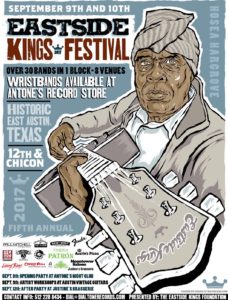
How To Find Your Voice: STOUT Lessons From Masters Of The Blues

Austin Vintage Guitar Shop
Last month, I wandered into a vintage guitar shop – one I’d driven by once a week for the last year but never really thought to visit. But ACL’s imminent arrival in Austin and Stout’s October theme of “Finding Your Voice” had put music on my mind.
What I found inside was unexpected.
Bit by bit a crowd gathered; enthusiasts who, custom-crafted Patron cocktails in hand, milled about a space filled with beautiful guitars of every kind and vintage. I had stumbled across something special, a part of what makes our town so unique.

Harmonica pros, Blues Masters: Alabama Mike, Birdlegg, Keith Dunn and Mike Milligan
It was the Eastside Kings Festival, and the crowd was awaiting a music download of sorts from some of the genre’s best harmonica pros: Alabama Mike, Birdlegg, Keith Dunn and Mike Milligan.
Most in the crowd were there to learn techniques and celebrate their love of the blues, but I found some fuel for the journey nestled within the wisdom and experience of these musical masters.
“In what these blues masters shared, I found some Stout fuel about the value of finding and sharing your own voice.”
So who and what inspired these badasses of blues (BoB) to discover their own voices?
Like many of us, they were inspired by their early surroundings. Brilliant gems poured out during the discussion as a stream of consciousness – one remembrance after another.
“My grandfather because on back porch praying, I would pay attention.”
“My mother, because she always had radio on growing up – WILD in Boston – Bobby Bland, Blues and Soul hits”
“Listening to records, and live music in Oakland California. Maurice McKi played guitar so real.”
“Seeing Birdlegg performing – there’s some separation there between playing harmonica and performing it.”
“I was raised on rock-n-roll…loved that harmonica player from the J. Giles Band-Magic Dick.”

So how do you find your true voice, and make yourself heard?
According to Keith Dunn, it’s something you have to discover for yourself.
“Nobody can tell you what you’re supposed to sound like, it’s unique, like your fingerprint,” he explains. “It’s abstract. It means different things to different people.”
He does offer one important tip, though: “You can learn something from anybody.”
Just like musical compositions, fewer voices speaking up makes for a flatter, less rich world.
Imagine a choir where every single member sang the same notes. No harmonies. No contrasts. No depth. No SPARK. Yet many of us, not knowing what to say or how to say it, hesitate to contribute to the global conversation.
With that in mind, here are some of the brilliant lessons these masters of the blues shared with me (along with some truly fantastic music) which I hope will inspire your find your voice and Bring Out Your Stout.
The world needs more harmony-find your voice and join in!
Stout Takeways on Finding Your Own Voice:
- Question Yourself. According to our BoB, the first step is to, “get into you—and bring what’s in your heart out to others.” That means looking deep inside and asking questions. “What is it you want to say?” “What is your take on things?” “What do you wish more people realized?”
- Be Authentic. “Don’t try to sound like anyone else,” these musicians advise. Don’t listen to others too much, and make sure when you do, you tune in to sources from multiple disciplines. “I stopped listening to harmonic players for about 12–15 years,” relays Mike Milligan. “l listened to guitar and sax to find another way to force myself not to go into the traps of sounding like someone else. Birdlegg’s secret? “You don’t need an amplifier, he states. “I’ve been playing 40 years without [one]. If you use an amplifier, you have a tendency to sound like anybody else and that’s what you don’t want to do, because you’ll never be recognized on sound.” Aim to be recognized for your own sound – whether it’s in a recording studio or on the pages of a blog.
- Build Stamina. When it comes to the harmonica, the guys say you must, “shorten note when you need to, hold it when you need to, but ya gotta have stamina.” The same is true for the journey to finding your own voice. Some elements will come quickly, some will take longer – you just need to stay strong to stay the course.
- Look for an Easy Fix. Sometimes you will lose your voice along the way, just as a harmonica loses notes. The key is to not panic. Instead, take solace in this wisdom from the blues. “There almost always comes a point where people we have problems with their harmonica. The notes will stop working. But usually it’s something very simple – all you have to do is get yourselves some alcohol q-tips and clean it. Nine times out of ten, that harmonica will start working just like new because it [just had] something, some kind of debris got in there.” If you find yourself unable to speak up, look for the quick fix – see what’s gotten lodged in your mind that’s keeping you from making yourself heard, and clean it out!
- Set Clear Goals. Our bluesmen were to the point on this step. Their simple plan for getting their voices heard? “Be the best in the damn world – that’s our goal.”
- Don’t Forget To Breathe. Sometimes, it’s too easy to get wrapped up in technique and effort. You end up missing the most fundamental things. The lesson from the blues? “Breathe in and out, spend some time and explore. Explore, and don’t be afraid to look silly. Release your expectations.”
Once you’ve found your voice, what’s next?
Keith Dunn’s secret for continuing to be heard is, “Always look for new sounds. I want to listen to everything I hear, like birds singing. For me, that’s a constant inspiration. As long as I’m alive, I’m inspired. Fellow panelist Birdlegg add this wisdom, “You don’t have to worry. You can never learn it all – it’s constant.”
In blues music, the voice comes from the soul. The same goes for your own voice – the power to find and express yourself lies within. Be inspired on your journey by the wisdom of those guitar shop musicians. Their final piece of advice? “If you want to preserve your harmonica . . . always brush your teeth before your play.”
